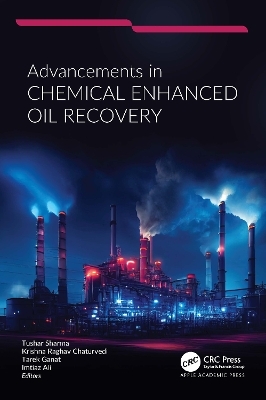
Advancements in Chemical Enhanced Oil Recovery
Apple Academic Press Inc. (Verlag)
978-1-77491-508-0 (ISBN)
This comprehensive book presents the latest advances in chemical EOR, considered to be an efficient technique to recover bypassed oil and residual oil trapped in reservoirs. The volume first provides an introduction to chemical EOR and discusses its viability. From there, it delves in the various EOR methods, including low-salinity water flooding, polymer and surfactant flooding, foam flooding, nanofluid flooding, hybrid methods, ionic liquid applications, and others. The book covers chemical synthesis of EOR agents and numerical simulation of compositional models in porous media, including a description of possible application of nanotechnology acting as a booster of traditional chemical EOR processes.
Tushar Sharma, PhD, is an Associate Professor at the Rajiv Gandhi Institute of Petroleum Technology, Jais, India, where he is also the Head and Lead Instructor at the Enhanced Oil Laboratory. His main areas of research include enhanced oil recovery, nanofluids, emulsions, and rheology. He has authored over 40 papers and has filed two patents with the Indian Patent Registry. Dr. Sharma worked as a visiting research fellow at the University of Alberta, Canada, on a project that focused on solvent-heavy oil interactions and microfluidic visualization for solvent-steam-assisted heavy oil recovery. Dr. Sharma has also conducted training seminars for engineers from Oil & Natural Gas Corporation (India). Krishna Raghav Chaturvedi, PhD, is an Outreach Manager at the American Chemical Society, working with the scientific community. His research focuses on improving the efficacy of CO -based 2 enhanced oil recovery in depleted oil fields to ensure a net-zero future. A highly cited "Top 2% Elsevier List" petroleum engineer turned carbon capture, utilization, and storage expert, he has two books to his credit along with more than 30 papers and two patents. He was awarded with the inaugural Best PhD Thesis Award in New Energy Studies (2022) by the Federation of the Indian Petroleum Industry. Tarek Ganat, PhD, is a Lecturer in Petroleum and Chemical Engineering at Sultan Qaboos University, Oman. Earlier, he was with the Petroleum Engineering Department at Universiti Teknologi Petronas, Malaysia. He has more than 25 years of experience in petroleum production and reservoir engineering through his participation in integrated studies with oil and gas companies. He has a wide range of overseas experience in fractured carbonate and clastic reservoir characterization and full field development and in the application of petroleum-industry related packages in multinational joint ventures. He has authored two textbooks and has published many papers in journals and conferences. Imtiaz Ali, PhD, is an Assistant Professor of Petroleum and Gas Engineering at Balochistan University of Information Technology, Engineering and Management Sciences, Pakistan. Dr. Ali worked with the Oil & Gas Development Company Pakistan before associating with the King Saud University, Riyadh, as a researcher. His research interests include chemical EOR, the development of non-damaging drilling fluids, CFDs, and formation damage. He authored five book chapters and has made 25 contributions to research journals
1. Introduction to Chemical Enhanced Oil Recovery (EOR) 2. Viability of EOR When Oil Prices Are Low? 3. Low-Salinity Water Flooding: Mechanisms and Status 4. Challenges, Opportunities, and the Way Ahead in Polymer Flooding 5. Surfactants in EOR 6. Binary Combinations for Chemical EOR: The Role of Alkalis 7. Foam Flooding for EOR: Viability in Modern Oil Reservoirs 8. Recent Trends in EOR: Nanofluid Flooding 9. Nanomaterials for Polymer and Surfactant Flooding 10. Foam Stabilization Using Engineered Nanomaterials 11. Emulsions for EOR 12. Mobility Control Requirement in EOR Processes 13. Ionic Liquid Applications in EOR 14. Hybrid Chemical EOR Using Low-Salinity Water Flooding 15. Polymer Rheology in Porous Media 16. Reservoir Simulation of Chemical EOR 17. Chemical Enhanced Oil Recovery in Unconventional Reservoirs 18. Chemical EOR in India 19. Conclusion
| Erscheinungsdatum | 09.07.2024 |
|---|---|
| Zusatzinfo | 20 Line drawings, color; 87 Line drawings, black and white; 12 Illustrations, color; 95 Illustrations, black and white |
| Verlagsort | Oakville |
| Sprache | englisch |
| Maße | 156 x 234 mm |
| Gewicht | 907 g |
| Themenwelt | Technik ► Elektrotechnik / Energietechnik |
| Technik ► Umwelttechnik / Biotechnologie | |
| Wirtschaft ► Volkswirtschaftslehre | |
| ISBN-10 | 1-77491-508-1 / 1774915081 |
| ISBN-13 | 978-1-77491-508-0 / 9781774915080 |
| Zustand | Neuware |
| Haben Sie eine Frage zum Produkt? |
aus dem Bereich


